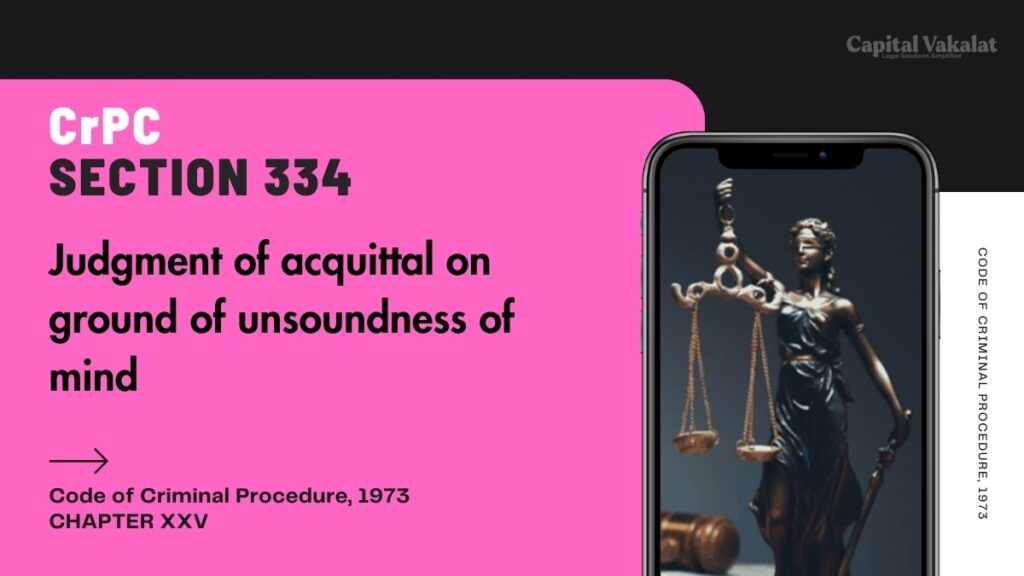In the labyrinth of criminal justice, the principles guiding the legal system must ensure both fairness and justice. One such principle is embodied in Section 334 of the Criminal Procedure Code (CrPC), which addresses the judgment of acquittal on the ground of unsoundness of mind. This provision ensures that individuals who, due to mental health conditions, cannot comprehend their actions are treated justly.

This article delves into the intricacies of Section 334 CrPC, its application, and its broader implications for the legal system and mental health advocacy.
Bare Act. Section 334 Cr.P.C.
Judgment of acquittal on ground of unsoundness of mind.
Whenever any person is acquitted upon the ground that, at the time at which he is alleged to have committed an offence, he was, by reason of unsoundness of mind, incapable of knowing the nature of the act alleged as constituting the offence, or that it was wrong or contrary to law, the finding shall state specifically whether he committed the act or not.
Section 334 CrPC: Legal Framework and Importance
Section 334 of the CrPC is a crucial legal provision that allows for the acquittal of an accused person if it is proven that they committed the offense while being of unsound mind. This section recognizes that mental illness can impair an individual’s capacity to understand the nature or illegality of their actions, warranting a different legal treatment.
Historical Context of Section 334 CrPC
The concept of mental health affecting criminal responsibility has deep historical roots. The evolution of Section 334 can be traced back to common law traditions and the M’Naghten Rules, which set out the standards for the insanity defense. These rules emphasize the importance of mental capacity in determining criminal liability.
Procedure Under Section 334 CrPC
When an accused claims unsoundness of mind, a detailed legal procedure is followed. The court must first ascertain the mental condition of the accused through medical examinations and expert testimonies. If unsoundness of mind is established, the court may pronounce a judgment of acquittal under Section 334 CrPC.
Role of Medical Evidence
Medical evidence plays a pivotal role in cases under Section 334 CrPC. The court relies heavily on psychiatric evaluations and expert opinions to determine the mental state of the accused at the time of the offense. This evidence must unequivocally establish the incapacity of the accused to appreciate the nature or wrongfulness of their actions.
Impact on the Accused
Acquittal under Section 334 CrPC has profound implications for the accused. While it means they are not held criminally liable, it often leads to mandatory psychiatric treatment and confinement in a mental health facility until they are deemed fit. This ensures both the safety of society and the well-being of the accused.
Challenges in Applying Section 334 CrPC
Applying Section 334 CrPC is fraught with challenges. Differentiating genuine cases of unsoundness of mind from feigned insanity requires meticulous legal and medical scrutiny. Moreover, there is a need for a balance between protecting society and safeguarding the rights of individuals with mental health conditions.
Case Studies Highlighting Section 334 CrPC
Several landmark cases have shaped the interpretation and application of Section 334 CrPC. For instance, the case of K. V. Dhanaji v. State of Maharashtra demonstrated the complexities involved in proving unsoundness of mind. Similarly, the State v. Mrs. Veena Sharma case highlighted the procedural nuances in such cases.
Mental Health and Legal Responsibility
Section 334 CrPC brings to the forefront the intersection of mental health and legal responsibility. It underscores the need for a nuanced understanding of mental health in the legal domain, advocating for a humane and just approach to criminal justice.
Comparative Analysis: Section 334 CrPC and Global Perspectives
Comparing Section 334 CrPC with similar provisions in other jurisdictions reveals both similarities and differences. For instance, the insanity defense in the United States and the UK’s Mental Health Act provide valuable insights into alternative approaches to mental health and criminal responsibility.
Rehabilitation and Reintegration
Post-acquittal, the focus shifts to the rehabilitation and reintegration of individuals acquitted under Section 334 CrPC. Comprehensive mental health support, vocational training, and community integration programs are essential to ensure their successful reintegration into society.
Future Directions for Section 334 CrPC
As societal understanding of mental health evolves, so too must the legal frameworks that address it. Future amendments to Section 334 CrPC could consider more robust safeguards, enhanced support systems, and continuous education for legal and medical professionals on mental health issues.
Conclusion
Section 334 CrPC represents a significant intersection of mental health and criminal law, ensuring justice is served with compassion and understanding. By acknowledging the impact of mental health on criminal behavior, this provision safeguards the rights of individuals while maintaining societal protection. As we continue to advance our understanding of mental health, Section 334 CrPC will undoubtedly evolve, reflecting a more just and humane approach to criminal justice.